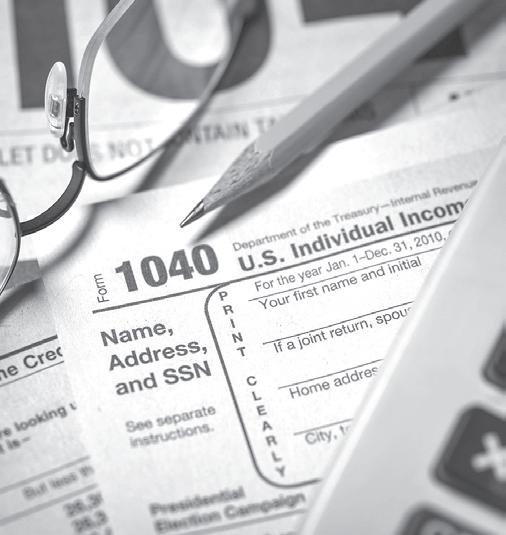LIFE PLANNING LIFE GUIDE 2023
 A supplement of the Lewiston Tribune & Moscow-Pullman Daily News
A supplement of the Lewiston Tribune & Moscow-Pullman Daily News

 A supplement of the Lewiston Tribune & Moscow-Pullman Daily News
A supplement of the Lewiston Tribune & Moscow-Pullman Daily News
Spring is noted for the sense of rejuvenation it inspires when temperatureswarmupandflowers begin to bloom. But in the United States, the onset of spring is followed shortly thereafter by tax season, which typically generates entirely different feelings than the firstsightofspringblooms.
Thedeadlinetofiletaxreturnsin theU.S.in2023isTuesday,April18. With that deadline looming, now is agoodtimetoconsiderthesethree basictaxpreparationtips,courtesy oftheInternalRevenueService.
Individuals can access or create their IRS account at irs.gov/ account. That ensures taxpayers have the latest information about their federal tax account and enables them to see information about their most recently filed return. A visit to irs.gov/account also allows individuals to make payments and apply for payment plans,amongotheroptions.

The IRS urges taxpayers to wait to file their returns until they have alloftheirrecords,including:
-FormsW-2fromemployer(s)
-Forms1099frombanks,issuing agencies and others payers, including unemployment compensation, dividends, pension, annuity or retirement plandistributions
- Form 1099-K, 1099-MISC, W-2, or other income statement ifyouworkedinthegigeconomy
- For 1099-INT if you were paid interest

- Other income documents and records of digital asset transactions, including convertible virtual currency and cryptocurrency,stablecoinsand non-fungibletokens(NFTs)
-Form1095-A,HealthInsurance Marketplace Statement, to reconcile advance payments or claim Premium Tax Credits for 2022Marketplacecoverage
-IRSorotheragencyletters
- CP01A Notice with your new IdentityProtectionPIN
CHECK YOUR INDIVIDUAL TAX IDENTIFICATION NUMBER.
The IRS notes that an ITIN only requires renewal if it has expired and is needed on a federal tax return. An expired ITIN can delay the processing of a return, which in turn can delay tax credits and refunds.

Taxpayersfilingwiththehelpofa licensedtaxprofessionalareurged to contact that individual to inquire about any additional information they may need to file a return on time. Make such an inquiry well in advance of the deadline to file so youhavesufficienttimetogatherall ofthenecessarydocumentation.
More information about filing taxesisavailableatirs.gov.
Metro Editorial
Income tax season is a happy time for many people. Those who anticipate a considerable refund on their taxes look forward to having extra money; some individuals even plan to finance big-ticket purchases entirelywiththeirtaxrefunds.
Smart money management can turn a refund check into a nice nest egg or stretch dollars to make the most of this windfall of cash. The following money-management tips can help anyone develop strong saving and spending habits that can paydividendsforyearstocome.
When looking to make the most of your tax refund, start by organizing yourfinancialdocumentsandgetting agrasponyourspendingandsaving behaviors. Examine your incometo-expenditures ratio to see where the majority of your money is going. It can be difficult to make significant changeswithregardtoyourfinances if you don’t have ready access to your financial records and a strong appreciation of how your money is beingspent.

When addressing your finances, take inventory of any high-interest loans,includingcreditcardbills.Itwill save you more money in the long run to pay off this type of debt as soon as possible. The earlier such debts are eradicated,thelessyouwillultimately pay in interest. What’s more, paying offdebthelpsestablishabettercredit record and score, which can make you eligible for lower interest rates in thefuture.Usingarefundtoeliminate debt is more beneficial than simply letting the refund sit in the bank, whereit’slikelytoaccruelessinterest each month than the interest that accrues on your credit accounts with outstandingbalances.

It is estimated that customers
who don’t have an account at a bank or credit union spend, on average, more than $800 at check-cashing businesses each year. Opening up an account with a credit union or bank will immediately save you money on check-cashing fees. Speaking with a banking representative can also provide information about various programs that will enable you to save your tax refund and earn money on it through interest accumulation. In the National Retail Federation’s annual Tax Returns Study, 40.2 percent of respondents said they planned to stash some of their refund in savings in 2013. While traditional savings or checking accounts may offer nominal interest rates, longer-term certificate of deposits or money market accounts may yieldmoreinterest.

Your income tax refund may be justwhatyouneedtostartinvesting. A 2012 study by TD Ameritrade indicated 63 percent of respondents said they plan to save or invest at leastpartofthemoneytheygetback on their taxes. A financial planner or stock broker can guide you through potential investments that carry the right portfolio and level of risk for your needs. If you prefer to do the work yourself, many investment companies have user-friendly websites where account holders can manage their own investments and monitor the daily performance of those investments. With the right investment,youcanturnyourrefund into a substantial amount of money overthecourseofseveralyears.
Stretchingtaxrefunddollarsmeans making smart choices regarding money management. Rather than splurging tax returns on big-ticket items, use your refund to grow your savings, begin an investment portfolioorpaydowndebt.
Individuals need not look very far to be reminded of the importance of planning for retirement. Television ad campaigns touting the need to plan for retirement have been front and center for many years. Banks alsoheavilypromotetheirretirement planning services to account holders. The emphasis financial firmsandbanksplaceonretirement planning underscores just how important it is for individuals from allwalksoflifetoprioritizesecuring theirfinancialfutures.
Adcampaignscanmakesavingfor retirement seem simple, but plenty ofpeoplemayhavequestionsabout how to save for the days when they arenolongerworking.


It’s never too early to start saving for retirement. Young professionals may not be anywhere close to retirement, but that doesn’t mean they can afford to put off saving for the day when they call it a career. Muchofthathastodowithinflation.
The rate of inflation varies, but it’s fair to assume that your cost of livingwillrisedramaticallybetween
your twenty-third birthday and your seventieth birthday. If you choose to simply save as opposed toinvestingthatmoney,yourmoney will not grow at a rate necessary to overcome inflation. Though there’s no guarantees with investing, traditional retirement investment vehicles have a proven track record of outpacing inflation. For example, Standard & Poor’s 500® (S&P 500) reports that individual retirement accounts(IRAs)grewbyanaverage of 10.8 percent between 1971 and 2020.Overthatsameperiod,theU.S. Bureau of Labor Statistics indicates thatthedollarhadanaveragerateof inflationof3.99percent.
Various investment vehicles can help people save for retirement. Many people utilize employersponsored 401(k) retirement plans. These allow individuals to deposit money via pre-tax contributions deducted from their paycheck. For young people, enrolling in these plansassoonasthey’reeligiblecan beagreatwaytobeginbuildingtheir retirement savings, and since many people contribute between 6 and 10percentoftheirpre-taxearnings,
their take-home pay will not be significantly different once they enroll. IRAs, pension plans, certain life insurance policies, and regular contributions to personal savings accountsaresomeadditionalaways tosaveforretirement.
No two people are the same, so there’s no simple answer to this question. Estimates about how much people will need in retirement range from 60 to 80 percent of their yearly income the year they stopped working fulltime. A financial advisor can be a usefulallyaspeopletrytocalculate howmuchtheywillneedtosavefor retirement. However, the simplest answer to this common question is that there’s no such thing as saving too much money for retirement so long as saving does not adversely
affectotherareasofyourlife.
No law prohibits people from withdrawing funds from designated retirement accounts before they retire. However, there may be significant financial penalties and tax consequences if you do so. For example, the Internal Revenue Service allows penalty-free withdrawals from a 401(k) after an account holder turns 591/2. Withdrawals made before then couldbesubjecttofederalandstate income tax and a 10 percent penalty of withdrawn funds. Individuals are urged to speak with a financial advisoraboutwithdrawalguidelines and penalties prior to opening a retirementaccount.
Saving for retirement is vital and it’snevertooearlytobegininvesting inyourfinancialfuture.

What constitutes a perfect retirement is different for everyone. Some people may imagine spending their golden years fishing their days away, while others may aspire to finally embrace their inner globetrotter. Though individuals’ retirement dreams differ, every retiree will need money, which only underscores the importance of a wise and disciplined approach to money management.





Average life expectancies have risen considerably over the last several decades. According to estimates from the United Nations Population Division, the average life expectancy in Canada for both sexes is just under 83 years,whileit’sslightlymorethan79intheUnitedStates. Those figures are a welcome sign, but they may inspire a little fear among seniors who are concerned that they

The picture of a traditional collegestudentisoneinhisorher lateteensorearly20s.However,a deeperlookmayrevealthatcollege student demographics are more diverse than one might imagine. In fact, senior citizens can rest assured that if they plan to return to the classroom, they’re likely to findstudentsaroundtheirage.
According to the senior citizen resource Elder Guru, just over 0.3 percent of university students are over 65. Even though that is a low number in the grand scheme of things, it is an indication that seniorshaveapresenceoncollege campuses. And that number is expected to rise. Universities are increasing efforts to include seniors as important parts of their student bodies. Here are some things seniors considering going backtoschoolmaywanttoknow.
Many schools are looking to expand their elder student body populationsbymakingiteasierfor them to go to school. That means seniors may be able to attend for little to no cost through tuition waiversanddiscounts.Speakwith an admissions officer about your options.

A survey from the Rand Corporation found that 39 percent of workers age 65 and older who were currently employed had
previously retired at some point. Going back to school may provide a foundation for new skills that can make it easier to advance in a second career. Heading back to classes also can help people stay competitiveinacurrentjob.

Going back to school provides seniors with an opportunity to engage with their peers and younger students. Returning to school may expose older adults to newexperiences,technologiesand customstheymayotherwisenever haveenjoyed.
Heading back to college can be challenging, which is something seniors looking for mental stimulation may enjoy. Senior Finance Advisor reports that heading back to school and lifelong learning has been linked tobetterhealth,improvedfinancial situations and even a reduced risk ofdementia.

Going back to school can enable seniors to stay technologically informed and learn about movements and other factors that are helping to shape the modern world.
Seniors have many reasons to return to the college classroom, and such a pursuit can pay numerousdividends.
A strong credit score is an undeniable asset for consumers. A strong standing in the eyes of potential creditors can save consumers money on relatively short-term expenses like vehicles andlong-termpurchaseslikehomes.

Consumercreditissoinfluentialin the lives of the average person that it pays to have some knowledge of whatitisandhowindividualscanuse ittotheiradvantage.
Consumer credit is typically issued by banks and retailers. One common question consumers have

is who owns credit cards, which are among the most recognizable and widely used forms of consumer credit. Many credit card companies, including Visa, are now publicly heldcompaniesafteryearsofbeing owned by banks. However, many major banks, including Capital One and Bank of America, issue credit cardsaswell.
According to the credit reporting agency Equifax®, a credit score is a three-digitnumberwhichrepresents anindividualconsumer'screditrisk. Credit risk refers to the likelihood thataborrowerwillpaytheirbillson time. Scores are typically between
300 and 850, and the higher the score, the more creditworthy and less risky a consumer is in the eyes ofcreditors.
Three different consumer reporting agencies (CRAs),


including Equifax®, determine credit scores. That's why it's not uncommonforasingleconsumerto have three different scores. Those scores should be similar, and if they'renotit'slikelythatoneormore


Pricesonthemajorityofgoodsand serviceshaveincreasedsignificantly over the last year-plus. Financial analysts report that inflation has reached heights that haven’t been seen in 41 years. According to the United States Department of Labor, the consumer price index, which measures changes in how much Americanspayforgoodandservices, rose0.4percentinSeptember.
Aspricessoared,families’budgets werebeingpushed.Whatcanpeople dointhefaceofrisingcostsonitems they need, including those who may be on fixed incomes? These suggestionsmayhelp.
Keeptrackofhowmuchitemscost right now. Document all spending by writing down a list of weekly expenses or utilizing any number of free budgeting apps available. Tracking what is going out may make it easier to cut costs on less essential items, such as streaming servicesorgymmemberships.
You may be able to negotiate betterdealswithaserviceprovider, such as a mobile phone company or a cable television provider, if they learn you are considering leaving. Iftheycan’tworkoutadeal,gowith thelessexpensiveprovider.Youcan alwaysswitchbackattheendofthe termifyoudesire.
Havingsubscriptionsandotherbills
automatically deducted from your checking account is convenient, but thoserisingcostsmaybeoverlooked. Byviewingyourbillandpayingiteach month,youcanseewherecostshave increasedandwhereyoumightneed torethinkservices.
Reduceexpendituresongasoline by sharing the costs with another person. Determine if public transportation is more costeffective than driving to work or schooleachday.
Brandloyaltytoonesupermarket or a particular retailer is quickly becoming a thing of the past. Nowadays it is wise to comparison shop across various stores to figure out where you’re getting the best deal. Venture into stores you may not have considered previously. Divide your shopping list by store category, visiting several for different items if it leads to big savings.
Cut down on energy costs by unplugging items when not in use. Reduce dependence on devices to further stem costs on electricity andgas-poweredappliances.
Prices continue to rise and consumers can explore various ways to stick to their spending budgets.

Consumers might not think it, but eggs are an expensive commodity. As of August 2022, the U.S. Bureau of Labor Statistics reported the average price of a dozen Grade A, largeeggswas$3.12.
Eggsarejustoneexampleoffoods that have become significantly more costly over the last year or more. Flour, butter/margarine and dairy products also have become more expensive. According to CNBC, food prepared at home now costs 10 percent more than it did a year ago. Comparatively speaking, restaurant prices have risen by 6.9 percent, making it more affordable for some people to eat out than preparemealsathome.
Despite rising food costs, it is possible to save money by cooking athome.
Switching to generic brands can immediatelybringaboutsavingsover “premium” counterparts. Generics cost less because manufacturers don’t have to offset the cost of advertising. Many generic brands are made in the same facilities that producenamebranditems.

Take a few moments to jot down meal ideas for the week. This can streamline the process of buying meals and help a person use fewer ingredients. Plus, meal plans can be based around which items are on sale. One can meal plan from scratch, or utilize a meal plan from a website that helps utilize all ingredients in various ways, such as turning leftover meatloaf from one nightintosloppyJoesonanother.
When meal planning, check out the pantry first to see what’s on hand,andthenmarkdowntheitems
needed. Buy only what is listed, resisting the urge to make impulse purchases. For those who can’t avoid throwing a few extra items in the wagon, utilize stores’ shop from home services, where it’s possible tokeeptrackofwhat’sbeingspentin realtime.Simplycheckoutandthen doacurbsidepickup.
When comparing prices, be sure to check out the net item, net pound or net ounce price. This enables shoppers to see if a sale is really a value, including whether it’s best to buy pre-packaged products or individualitems.
Make the bulk of meals with less expensive ingredients, such as beans,wholegrainsandvegetables. Chicken drumsticks or thighs are generally cheaper than steaks or evenchickenbreastsandcutlets.

Opt for water at home rather than bottled, if possible. Purchase iced tea powder or tea bags and whip up brews. Water with lemon juice can replacelemonade.
These are just a few ways to save money on groceries as prices continuetorise.

Arapidriseinthecostoflivingwill undoubtedly prove to be one of the major stories of 2022. According to the U.S. Bureau of Labor Statistics, energy prices rose by 41.6 percent in the 12-month period that ended in June 2022, marking the highest 12-monthincreasesinceApril1980.
The significant spike in energy costs is somewhat misleading, as theBLSconsidersmotorfuelprices, whichrosemorethan60percentin the12-monthperiodendinginJune 2022, part of the energy category. However, during that same period, electricity prices rose by nearly 14 percent while natural gas prices increased by 38 percent. Both of those increases were more significantthanthemorepublicized rise in food prices, which rose by rightaround10percent.
Families need to eat and many professionals now must return to in-person work after years of pandemic-related remote working, which means they must confront higher fuel costs. That leaves little room to save money in those areas. However, there are ways for families to reduce home energy costs without adversely affecting theirqualityoflife.
According to the United States DepartmentofEnergyandtheU.S. Environmental Protection Agency, the best time to use appliances in a home is when overall electricity use is low. Though this time changes depending on the season and can vary based on geography, theDOEandtheEPAbothnotethat after 9 p.m. and before 9 a.m. are generally the off-peak hours in mostareas.

The energy providers at
ConEd estimate that about 40 percent of unwanted heat comes through windows. Strategic use of curtains, shades and blinds can keep heat out on hot days, thus allowing homeowners to turn the thermostat up on their air conditioning units in summer. Opening curtains, blinds and shades on winter mornings and afternoons will allow more sunlightin,allowinghomeowners to control heating costs more effectively.
Thereareplentyofcontradictory strategies regarding how best to store foods in a refrigerator so the unit consumes as little energy as possible while still keeping foods fresh and chilled. But various energy providers, including ConEd, recommend that consumers avoid packing a fridge too tightly. By allowing cold air to circulate within the refrigerator, the refrigerator won't need to work as hard, and thus consume as much energy, to keep foods cool.It'simportanttonotethatthe opposite should govern how the freezer is packed. Packing frozen items tightly in the freezer will help the refrigerator work a little lesshard.
Estimates from the U.S. Energy Information Administration indicatethatelectricityforlighting accounts for around 10 percent of electricity consumption in homes. Aconcertedefforttoturnofflights in rooms that aren't being used canhelpconsumerssavemoney.
Risingutilitybillsarecompelling millions of people to seek ways to trim their energy consumption. Thankfully, there are many ways to do that without upsetting daily routines.
might outlive their money. No one knows how long they will live, but everyone can embrace a handful of money management strategies to increase the chances that they won’t feel a financialpinchinretirement.

Everyretirementinvestmentvehicle,whether it’s an IRA or a 401(k), has tax implications. Money withdrawn too early may incur tax penalties,andevenmoneywithdrawnlongpast retirementagecouldelevateretireesintoanew tax bracket that could prove costly. A financial advisor can help retirees determine the tax implications of withdrawing money from their retirement accounts and may even develop a detailed guideline of when withdrawals should bemadeandhowmuchshouldbewithdrawnin agivenyearinordertominimizetaxliabilities. Prioritizeyourownneeds
Though retirees, particularly those with children and grandchildren, may feel an obligation to help their families in difficult financial times, generosity can be very costly for adults who have stopped working. Retirees may or may not have opportunities to generate newincome,andeventhosewhodolikelywon’t makeenoughtomeettheirdailyfinancialneeds. Given that reality, retirees must prioritize their own financial needs, including their immediate needs and those they will have for the rest of their lives. Though it might be difficult to turn down loved ones’ requests for financial help, retirees must make sure they can pay their bills and maintain a quality of life that won’t jeopardizetheirlong-termhealth.

Equityinahomeisafeatherinthecapofmany retirees.Retireeswhoowntheirhomesandlive in locations with high property taxes might be able to cash in on their equity by selling their homes and downsizing to a smaller home with lower property taxes. If moving is not a consideration,discussareversemortgagewith a financial advisor. A trusted financial advisor
CRA reports has an error or errors. A host of variables are considered when determining a credit score, andtheseinclude:
·Paymenthistory
·Creditutilizationratio,whichis theamountofcreditusedversus thetotalavailablecredit

· Types of credit accounts a consumer has. This includes revolving credit accounts, like consumer credit cards, and installment accounts, which include mortgages and auto loans.
·Credithistorylength
· Frequency of credit inquiries (numerous inquiries in a short period of time generally lower a consumer'screditscore)
Credit scores are so significant because they can cost or save consumers a substantial amount of money. Consumers with poor scores, which are generally considered scores between 300 and 669, may not be eligible for auto or mortgage loans and may only be able to secure credit cards with high interest rates. By contrast, consumers with scores considered very good to excellent (740 and above) generally get more favorable interest rates on sizable purchases like cars and homes, which can save borrowers tens of thousands of dollars over theirlifetimes.
Managing credit is a vital component of financial planning. Knowing the basics to consumer credit can set individuals on a soundfinancialpath.
canhighlighttheadvantagesanddisadvantages of reverse mortgages, which are a great option forsomepeopletoimprovetheirfinancialwellbeinginretirement.
The U.S. Department of Health and Human Services reports that roughly 70 percent of individuals who turn 65 will need long-term care in their lifetimes. That’s just one expense retirees must budget for, and it’s more sizable than some people may recognize. In fact, the Fidelity Retiree Health Care Cost Estimate found that the average retired couple age 65 in 2022willneedroughly$315,000tocoverhealth care expenses in retirement. And health care costs are just one of many expenses retirees can expect to have. Budgeting and avoiding overspending can ensure retirees have the moneytheyneedwhentheyneedit.
No one wants to outlive their money in retirement.Variousstrategiescanhelpretirees effectively manage their money so they can enjoy their golden years without having to worryabouttheirfinances.




















